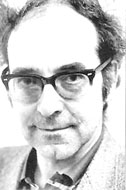
Movie Guru Rating:

Comment
on this review
| |

Godard's In Praise of Love deserves neither
by Joey Cody
It is, indeed, the era of the ugly American. And, certainly, the way the French in particular loathe and mock us is no secret. But, despite current citizenship shame, I sure did get my patriotic back up after enduring Jean-Luc Godard's �loge de l'amour (In Praise of Love, 2001)—a tiresome hodgepodge of hackneyed philosophical ramblings and shockingly flawed anti-American sentiment.
Not that I was at all surprised, mind you. Godard, as one of the founders of the French New Wave, has never been shy about airing his anti-American views. What's surprising about his latest "comeback" film is that he's so very uncreative and unintelligent in his revulsion. Yes, I disagreed with many of his statements, but, moreover, it was distressing to see such narrow-minded self-righteousness surrounded by such beautiful camerawork. Like a fine éclair, filled with Cool Whip and crap.
The first half of the film, artfully shot (on black and white film, but of course), follows an artist, Edgar, as he explores a film project on love. He researches the subject from four stages (meeting, attraction, separation, reconciliation) and from three perspectives (youth, adulthood, old age). Mostly, though, Edgar halfheartedly conducts auditions and wanders around, thumbing through a blank notebook and spouting empty axioms.
In the midst of his navel-gazing, he runs into a young woman (named only "She"), whom he met years before, and just as his project is about to blossom, she dies. In her absence, and due to his disillusionment over the "adulthood" aspect of love, the project appears doomed.
The second half (shot on video for some reason) moves us back in time to when he first met the woman—while he is researching the French Resistance for the purpose of writing a cantata about Simone Weil. The woman is scrutinizing a Hollywood film contract for her grandparents' involvement during the Nazi occupation of France.
While the film is technically proficient, the disjointed story makes no sense. It flip-flops among themes and never eloquently ties them together. And although Godard undoubtedly has an eye for capturing striking moments, he ruins those visuals with unreasoned babbling—ironic for the man who once said, "There is no point in having sharp images when you've fuzzy ideas."
At one point, She attempts to condemn the insubstantiality of U.S. identity by examining the term "American." (Pointing out that Mexico and Canada and Brazil all have united states, and could thereby each be called "the united states of America.") This kind of flimsy, carping dialogue exposes how Godard's criticisms are beyond irrelevant—they're incorrect.
Another case in point: "The Americans have no real past," Edgar declares. "They have no memory of their own. They buy the pasts of other people and sell images." (This view is used—hypocritically and nonsensically—to demonize Hollywood, Steven Spielberg in particular.)
Excuse moi, but Americans don't have a past? We have a ton of colorful and significant cultural and historical stories to tell. And a more recent origin does not a lack of history make. This elitist attitude is exactly the kind of European superiority that Americans abhor. And the kind of blind nationalism that is just a hop and a skip away from racism.
But Godard is concerned only with history with a capital "H," apparently meaning his country's own older, memory-washed past. (Which, by the way, we Yanks were a big part of—'scuse me for sounding like my Purple Heart-wearing grampa when I remind him we saved their butts in not one, but two world wars.)
Godard holds up the French Resistance as an illustration of France's glorious past (and in comparison to our evil capitalism), but he conveniently omits the Vichy government and the French collaboration with the Nazis. And his references to the Resistance are childishly simplified and sugarcoated. When he implies that Americans do not understand resistance, whom does he think he's kidding?
Instead of compelling philosophy, we're treated to boring, ambiguous musings on art, time, love, History, and the state (silly little turds like, "Each thought should recall the debris of a smile") that make you scratch your head, but not in a good way. His reflections are tedious and jejune, and nearly every statement becomes a contradiction. Among the hollow aphorisms, only his overarching theme is valid: "It's only when things are over that they make sense." But, while true in life, not so with this film. Forrest Gump and Jack Handy are more intriguing and relevant.
In Praise, Godard repeatedly points out how sad it is for a bitter old person to insist on living in the past. But, as incoherent as his ramblings are, it's difficult not to dismiss them amusedly as so much French snobbery. The man himself teeters on the brink of professional paranoia and senility.
Yes, it seems that the 72-year-old filmmaker no longer has any teeth—literally and figuratively. He claims Americans love existence (that is, living) over life. May be true. But, with Praise, Godard shows he loves thinking over thought.

January 16, 2003 * Vol. 13, No. 3
© 2000 Metro Pulse
|





